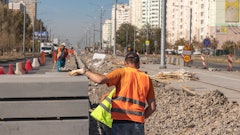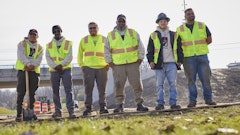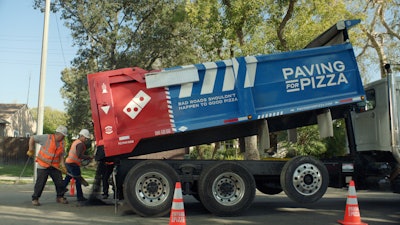
Normally when Domino’s Pizza asks “small, medium or large?” they’re filling an order for a pizza. But since last July they’ve been filling small, medium and large potholes and providing for other road repairs – and they’re only half done.
That’s because a clever ad campaign that required input from pizza-buying customers and cooperation from various municipalities has already helped repair pavement in almost two dozen states – and Domino’s Pizza is on its way to smoothing the route for pizza carryout and delivery for one city in each of the 50 states.
Initially the ad campaign had planned to provide a $5,000 grant to 20 municipalities, the idea being that the cities would put that money to use repairing roads.
“We started in July and it really took off. People loved it,” says Jenny Fouracre, director of public relations for Domino’s. “So at the end of August we decided to amp it up and do one municipality in all 50 states.”
By early November 22 cities in 22 states “have done everything they need to do and have started the process of paving” and Dominos has handed out $110,000 in Paving for Pizza grants.
“And we’re working through the next 28 states,” Fouracre said.
How “Paving for Pizza” Works
“The idea for the campaign was the result of a lot of talking with our customers,” Fouracre says. “We have a whole team that is devoted to getting customer insights, and they heard a couple of stories regarding carryout pizzas and people driving their pizzas home.”
So Dominos looked into it and realized that the pizzas being driven over roads that are in poor condition can be damaged before they can be eaten.
To verify the extent of damage, Domino’s placed a camera inside a pizza warmer, then drove the pizza over roads of varying quality. The camera recorded the results, and the results can be seen at PavingforPizza.com, under the tagline “Bad roads shouldn’t happen to good pizza.”
The site invites visitors to select a road condition (they can choose mild, moderate, critical or catastrophic) from its “Pothole Impact Meter.” Once selected the site plays a video – the “Pizza Damage Report” – to show exactly what happens to a pizza as it is driven to its destination over a road in that condition.
Visitors to the site can then enter a zip code for their city or county to help get a Paving for Pizza grant for their town. Fouracre says the site has received more than 137,000 nominations covering more than 15,000 zip codes.
Domino’s tracks and counts the nominations for each zip code and the zip codes with the greatest number of nominations become eligible for a grant. Domino’s then reaches out to the municipality.
“Every municipality is different because some are not set up to accept a grant,” Fouracre says. “So we can’t just give them the money. Some have to get city council approval or the approval of the city’s attorney or whatever their specific process is. So even once we select a municipality it can take a while before we can send them the grant. But once all the Is are dotted and the Ts are crossed we send them a check and an Asset Kit and they can give us the date they plan to start paving.”
The Asset Kit, Fouracre says, is to inject a little fun into the campaign and the process. It includes jobsite signs, magnetic truck signs with the Domino’s logo, Paving for Pizza business cards and stickers and even stencils for use once the job is done.
Fouracre says that Domino’s asks each municipality to use the $5000 for paving projects in their town “and they get to decide how that happens.” She says many of the municipalities have their own crews to perform road repairs, but municipalities aren’t prevented from subcontracting the work to a private contractor.
She says cities are welcome to report back to Domino’s what they accomplished with the grant and a number of them have:
- Bartonville, TX – Filled 8 potholes and repaired 3 roads
- Athens, GA – Repaved 150 square yards of failing roads
- Burbank, CA – Repaired 5 potholes, 1 road improved
- Milford, DE – Repaired 40 potholes on 10 roads in 10 hours
Other cities that have accepted a grant and are in the process of repairing roads include Wilkes-Barre, PA; Fitchburg, MA; Kinston, NC; Des Moines, IA; Marion, TX; Havre, MT; Milwaukee, WI; Hamtramck, MI; Grand Forks, ND; New Orleans, LA; and Jackson, MS.
Fun...and Successful
“It’s been a campaign that’s been fun for our customers, for the cities and for our stores,” she says. “Our customers like that they’re being listened to and we think everyone is having some fun with it.
“For us it’s being part of their community. People really love that we’re out there doing something for their neighborhood and our stores really like it – after all it’s their neighborhood, too, and they’re getting some recognition for it.”
In fact, local Domino’s outlets are supporting the program by providing free pizzas to Paving for Pizza crews on the job.
Fouracre says the campaign will continue until Domino’s has provided grants to one city in each state. She said a number of municipalities are currently working through their process so they can accept a grant but there are still additional cities in additional states to be selected. She said she expects the approval process to continue through the winter but some cities have already indicated that they will wait to spring to make their road repairs.
“The concept is we care about our customers and their experience and we want to make the carryout pizza experience the best it can be,” Fouracre said.
Nominations for cities are being accepted through the end of 2018.

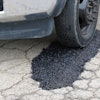



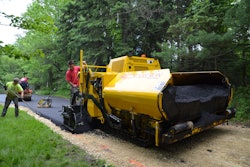
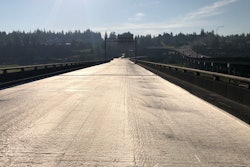
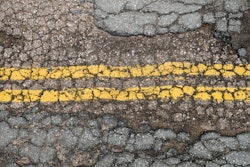




![Lee Boy Facility 2025 17 Use[16]](https://img.forconstructionpros.com/mindful/acbm/workspaces/default/uploads/2025/09/leeboy-facility-2025-17-use16.AbONDzEzbV.jpg?ar=16%3A9&auto=format%2Ccompress&fit=crop&h=135&q=70&w=240)


